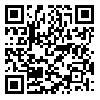BibTeX | RIS | EndNote | Medlars | ProCite | Reference Manager | RefWorks
Send citation to:
URL: http://rjms.iums.ac.ir/article-1-2658-en.html

 , Mohammad Reza Vafa *1
, Mohammad Reza Vafa *1 
 , Fariba Kolahdooz1
, Fariba Kolahdooz1 
 , Hamideh Koosha2
, Hamideh Koosha2 
 , Fathollah Poorali2
, Fathollah Poorali2 
 , Fariba Mahmoodpour2
, Fariba Mahmoodpour2 
 , Fariba Bakhshiyan2
, Fariba Bakhshiyan2 
 , Mohammad Saleh Al - e Molana2
, Mohammad Saleh Al - e Molana2 
 , Mahboobeh Shaneshin3
, Mahboobeh Shaneshin3 
 , Saeedeh Vaseti2
, Saeedeh Vaseti2 

2- Tabriz University of Medical Sciences
3- Shahid Beheshti University of Medical Sciences
Background:
The aim of the study is to assess knowledge and behavior of participants about
dietary fats pattern. Also, our goal was to design a nutrition education
program about dietary fat intakes which is relatively brief and low cost in
terms of time and material.
Methods: In this
experimental study we recruited three groups of household women under the cover
of health centers of Tabriz city as Random-cluster sampling method. Group A (n= 90) participated for 3 sessionsand
group B (n= 86) for 5 sessions education intervention about dietary fat
pattern. Also group C (n= 90) were allocated as control group. We randomly
selected some partners (n= 65) of intervention groups (group A and B), as
reinforces factors, the other control group. For evaluation, a knowledge and
behavior questionnaire was administrated to all groups. Furthermore, the
effectiveness of education was compared among two intervention groups with
different attendance classes.
Results: For mean scores
knowledge, no significant difference existed between groups. Mean score of
behavior were less than 50% in all groups [group A: 49.3±16.5, group B:
44.3±17.7, group C: 43.57±13.5 and group M: 50.51±18.66]. Mean scores of
knowledge and behavior showed a significant difference in the intervention
groups(post-test versus pre-test)[ group A: 79.4±23.6 and group B 83.22±21.5, p<0.001].
Different impacts of class attendances have not significant effectiveness for
knowledge and behavior to compare two intervention groups (groups A and B), but
significant compared control group (group C) (p=0.0001).
Conclusions: Women
had low knowledge about optimal dietary fat pattern and behavior levels were
poor. Short time education program was effective for household women.



